Ethical Analysis: Early Launch Case Study and ACS Professional Codes
VerifiedAdded on 2023/05/30
|6
|1497
|51
Essay
AI Summary
This essay provides an in-depth analysis of the ethical issues surrounding an early software launch, based on a case study where a project manager faces pressure to release software before encryption is complete. The analysis is conducted through the lens of the Australian Computer Society (ACS) Code of Professional Conduct, examining aspects such as primacy of public interest, enhancement of quality of life, honesty, competence, professional development, and professionalism. The essay argues that launching the software without proper testing and encryption is unethical and violates several tenets of the ACS Code. It concludes with a recommendation for the project manager to consult with the team and program director, emphasizing the importance of encryption testing to resolve the ethical dilemma. The essay highlights the significance of ethical considerations in IT project management and the potential consequences of prioritizing business interests over ethical conduct.
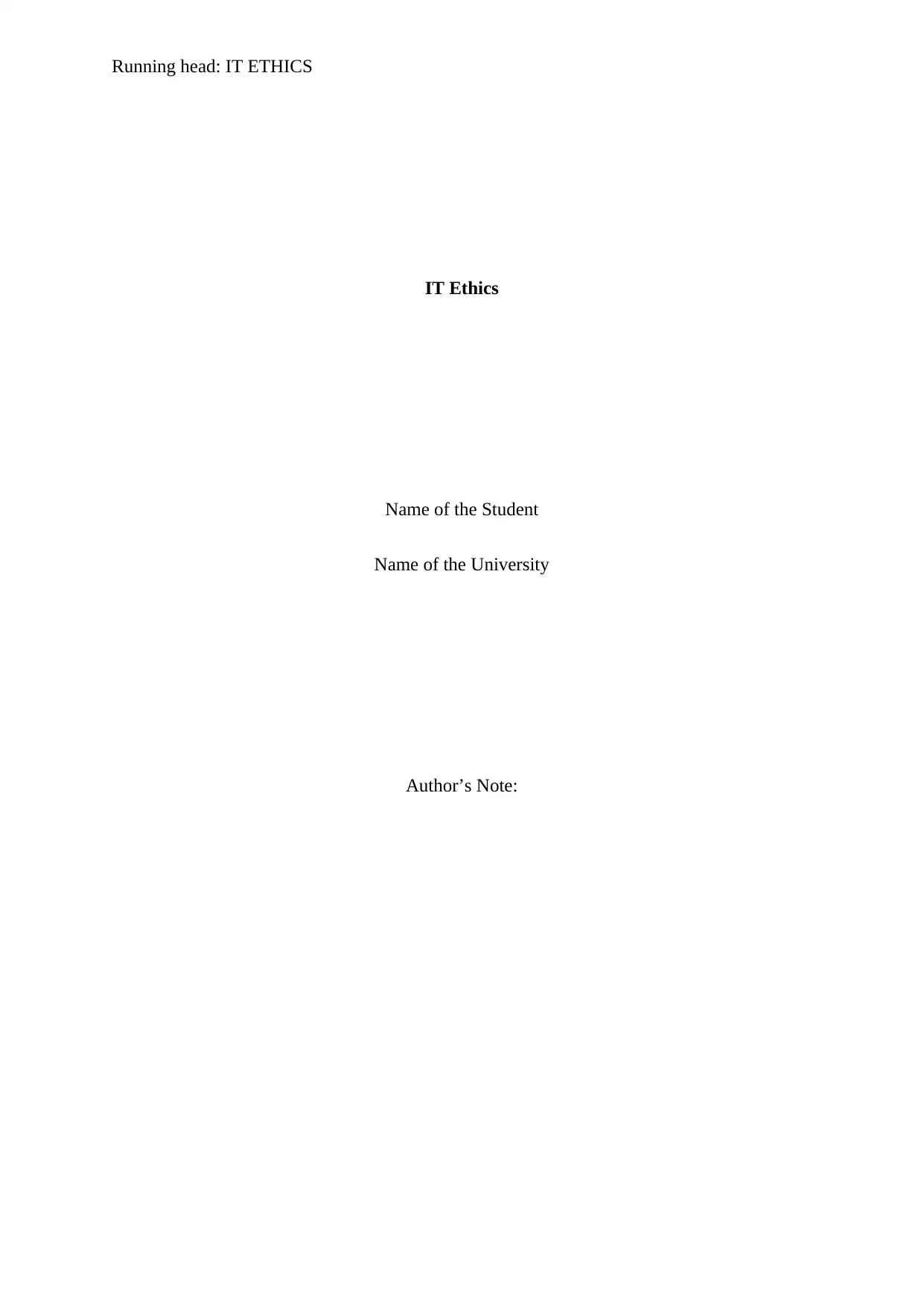
Running head: IT ETHICS
IT Ethics
Name of the Student
Name of the University
Author’s Note:
IT Ethics
Name of the Student
Name of the University
Author’s Note:
Paraphrase This Document
Need a fresh take? Get an instant paraphrase of this document with our AI Paraphraser
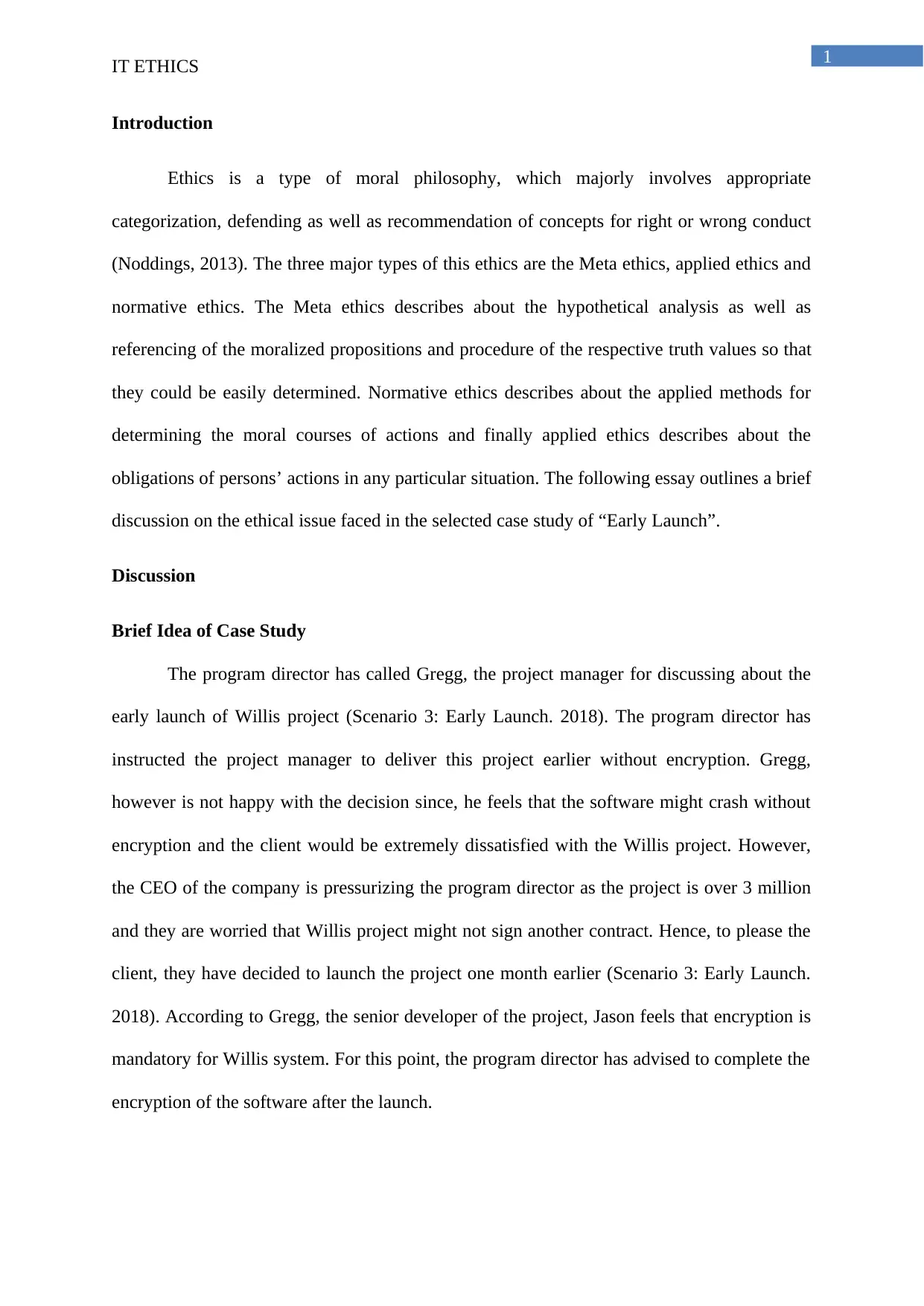
1
IT ETHICS
Introduction
Ethics is a type of moral philosophy, which majorly involves appropriate
categorization, defending as well as recommendation of concepts for right or wrong conduct
(Noddings, 2013). The three major types of this ethics are the Meta ethics, applied ethics and
normative ethics. The Meta ethics describes about the hypothetical analysis as well as
referencing of the moralized propositions and procedure of the respective truth values so that
they could be easily determined. Normative ethics describes about the applied methods for
determining the moral courses of actions and finally applied ethics describes about the
obligations of persons’ actions in any particular situation. The following essay outlines a brief
discussion on the ethical issue faced in the selected case study of “Early Launch”.
Discussion
Brief Idea of Case Study
The program director has called Gregg, the project manager for discussing about the
early launch of Willis project (Scenario 3: Early Launch. 2018). The program director has
instructed the project manager to deliver this project earlier without encryption. Gregg,
however is not happy with the decision since, he feels that the software might crash without
encryption and the client would be extremely dissatisfied with the Willis project. However,
the CEO of the company is pressurizing the program director as the project is over 3 million
and they are worried that Willis project might not sign another contract. Hence, to please the
client, they have decided to launch the project one month earlier (Scenario 3: Early Launch.
2018). According to Gregg, the senior developer of the project, Jason feels that encryption is
mandatory for Willis system. For this point, the program director has advised to complete the
encryption of the software after the launch.
IT ETHICS
Introduction
Ethics is a type of moral philosophy, which majorly involves appropriate
categorization, defending as well as recommendation of concepts for right or wrong conduct
(Noddings, 2013). The three major types of this ethics are the Meta ethics, applied ethics and
normative ethics. The Meta ethics describes about the hypothetical analysis as well as
referencing of the moralized propositions and procedure of the respective truth values so that
they could be easily determined. Normative ethics describes about the applied methods for
determining the moral courses of actions and finally applied ethics describes about the
obligations of persons’ actions in any particular situation. The following essay outlines a brief
discussion on the ethical issue faced in the selected case study of “Early Launch”.
Discussion
Brief Idea of Case Study
The program director has called Gregg, the project manager for discussing about the
early launch of Willis project (Scenario 3: Early Launch. 2018). The program director has
instructed the project manager to deliver this project earlier without encryption. Gregg,
however is not happy with the decision since, he feels that the software might crash without
encryption and the client would be extremely dissatisfied with the Willis project. However,
the CEO of the company is pressurizing the program director as the project is over 3 million
and they are worried that Willis project might not sign another contract. Hence, to please the
client, they have decided to launch the project one month earlier (Scenario 3: Early Launch.
2018). According to Gregg, the senior developer of the project, Jason feels that encryption is
mandatory for Willis system. For this point, the program director has advised to complete the
encryption of the software after the launch.
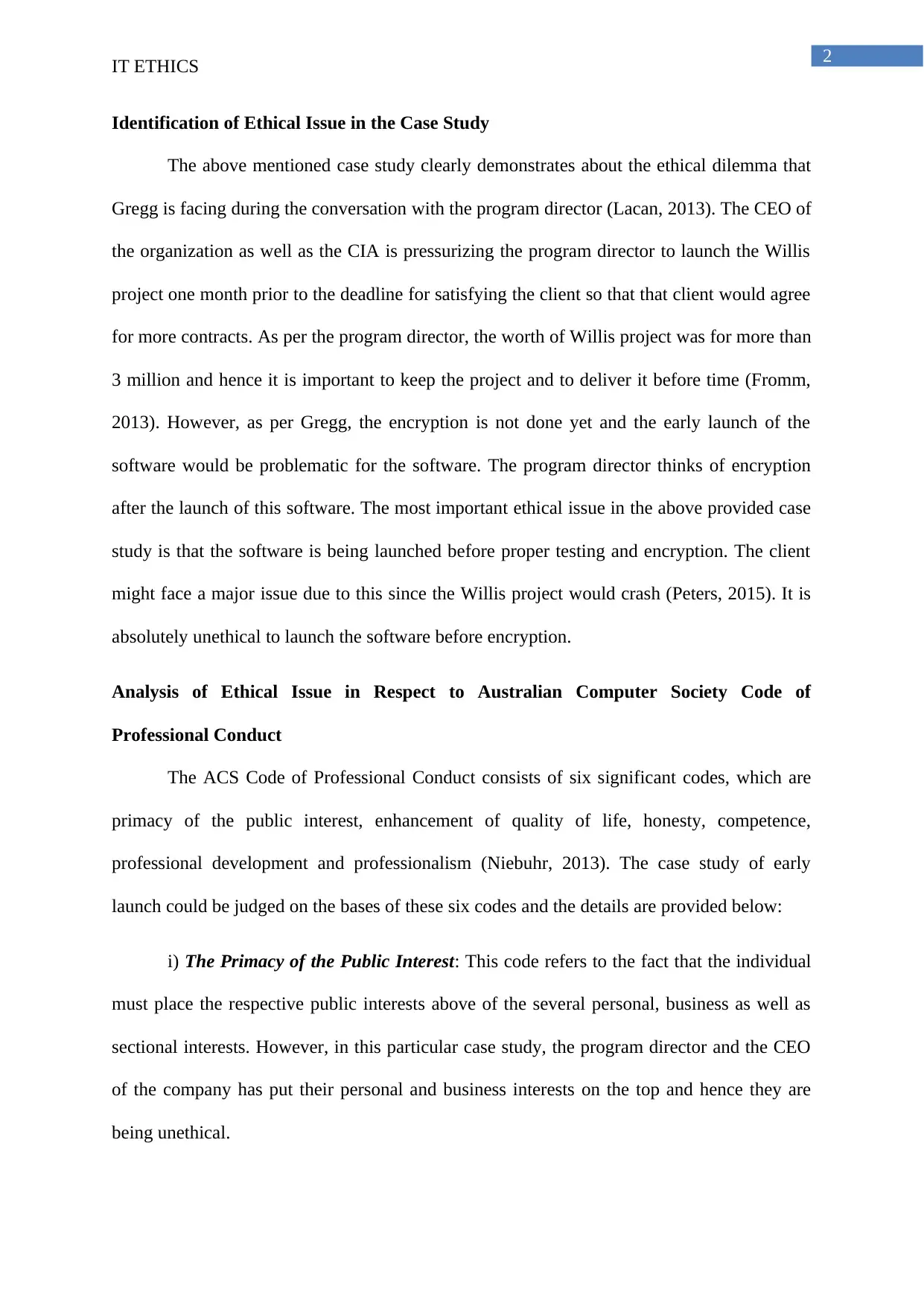
2
IT ETHICS
Identification of Ethical Issue in the Case Study
The above mentioned case study clearly demonstrates about the ethical dilemma that
Gregg is facing during the conversation with the program director (Lacan, 2013). The CEO of
the organization as well as the CIA is pressurizing the program director to launch the Willis
project one month prior to the deadline for satisfying the client so that that client would agree
for more contracts. As per the program director, the worth of Willis project was for more than
3 million and hence it is important to keep the project and to deliver it before time (Fromm,
2013). However, as per Gregg, the encryption is not done yet and the early launch of the
software would be problematic for the software. The program director thinks of encryption
after the launch of this software. The most important ethical issue in the above provided case
study is that the software is being launched before proper testing and encryption. The client
might face a major issue due to this since the Willis project would crash (Peters, 2015). It is
absolutely unethical to launch the software before encryption.
Analysis of Ethical Issue in Respect to Australian Computer Society Code of
Professional Conduct
The ACS Code of Professional Conduct consists of six significant codes, which are
primacy of the public interest, enhancement of quality of life, honesty, competence,
professional development and professionalism (Niebuhr, 2013). The case study of early
launch could be judged on the bases of these six codes and the details are provided below:
i) The Primacy of the Public Interest: This code refers to the fact that the individual
must place the respective public interests above of the several personal, business as well as
sectional interests. However, in this particular case study, the program director and the CEO
of the company has put their personal and business interests on the top and hence they are
being unethical.
IT ETHICS
Identification of Ethical Issue in the Case Study
The above mentioned case study clearly demonstrates about the ethical dilemma that
Gregg is facing during the conversation with the program director (Lacan, 2013). The CEO of
the organization as well as the CIA is pressurizing the program director to launch the Willis
project one month prior to the deadline for satisfying the client so that that client would agree
for more contracts. As per the program director, the worth of Willis project was for more than
3 million and hence it is important to keep the project and to deliver it before time (Fromm,
2013). However, as per Gregg, the encryption is not done yet and the early launch of the
software would be problematic for the software. The program director thinks of encryption
after the launch of this software. The most important ethical issue in the above provided case
study is that the software is being launched before proper testing and encryption. The client
might face a major issue due to this since the Willis project would crash (Peters, 2015). It is
absolutely unethical to launch the software before encryption.
Analysis of Ethical Issue in Respect to Australian Computer Society Code of
Professional Conduct
The ACS Code of Professional Conduct consists of six significant codes, which are
primacy of the public interest, enhancement of quality of life, honesty, competence,
professional development and professionalism (Niebuhr, 2013). The case study of early
launch could be judged on the bases of these six codes and the details are provided below:
i) The Primacy of the Public Interest: This code refers to the fact that the individual
must place the respective public interests above of the several personal, business as well as
sectional interests. However, in this particular case study, the program director and the CEO
of the company has put their personal and business interests on the top and hence they are
being unethical.
⊘ This is a preview!⊘
Do you want full access?
Subscribe today to unlock all pages.

Trusted by 1+ million students worldwide
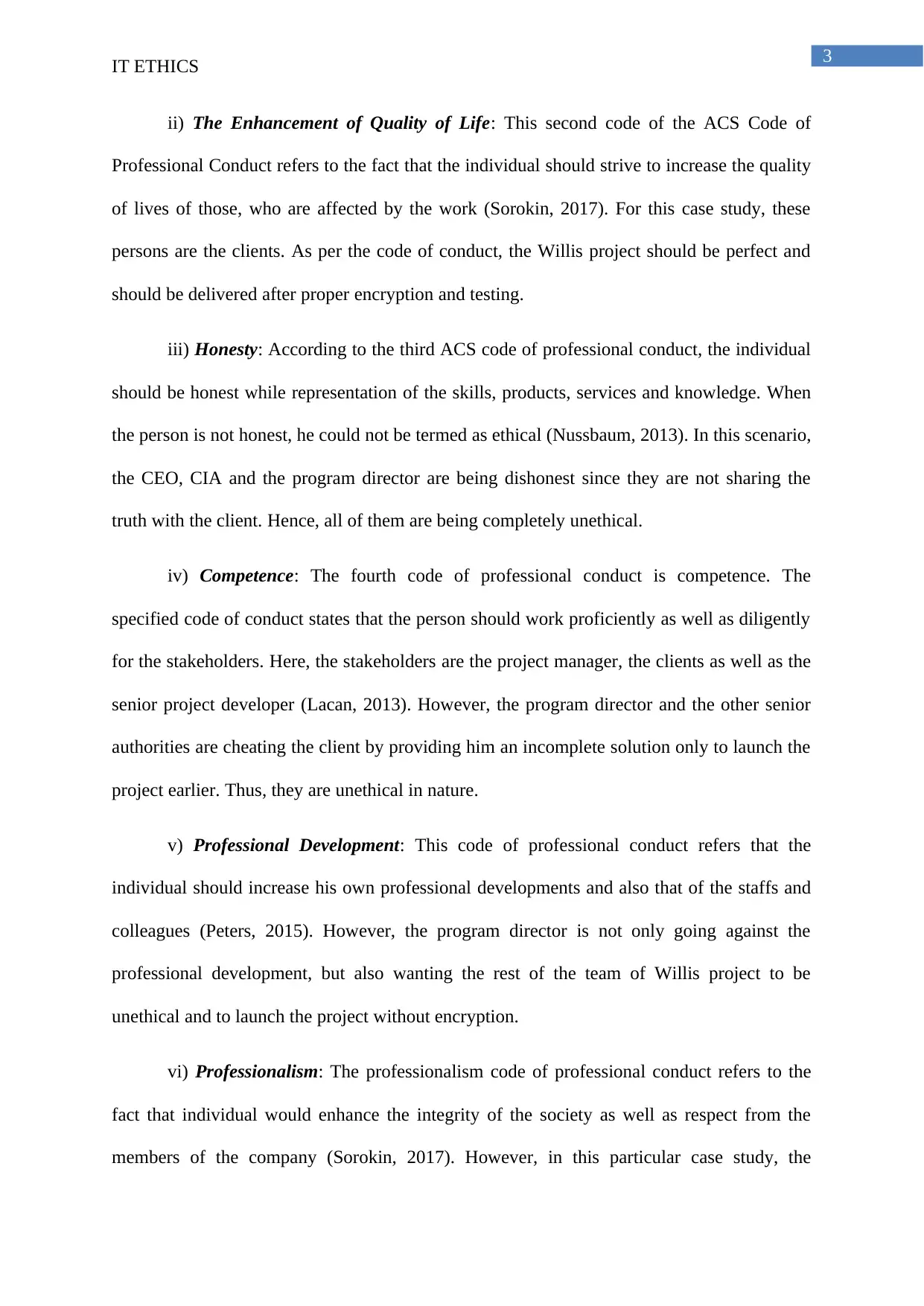
3
IT ETHICS
ii) The Enhancement of Quality of Life: This second code of the ACS Code of
Professional Conduct refers to the fact that the individual should strive to increase the quality
of lives of those, who are affected by the work (Sorokin, 2017). For this case study, these
persons are the clients. As per the code of conduct, the Willis project should be perfect and
should be delivered after proper encryption and testing.
iii) Honesty: According to the third ACS code of professional conduct, the individual
should be honest while representation of the skills, products, services and knowledge. When
the person is not honest, he could not be termed as ethical (Nussbaum, 2013). In this scenario,
the CEO, CIA and the program director are being dishonest since they are not sharing the
truth with the client. Hence, all of them are being completely unethical.
iv) Competence: The fourth code of professional conduct is competence. The
specified code of conduct states that the person should work proficiently as well as diligently
for the stakeholders. Here, the stakeholders are the project manager, the clients as well as the
senior project developer (Lacan, 2013). However, the program director and the other senior
authorities are cheating the client by providing him an incomplete solution only to launch the
project earlier. Thus, they are unethical in nature.
v) Professional Development: This code of professional conduct refers that the
individual should increase his own professional developments and also that of the staffs and
colleagues (Peters, 2015). However, the program director is not only going against the
professional development, but also wanting the rest of the team of Willis project to be
unethical and to launch the project without encryption.
vi) Professionalism: The professionalism code of professional conduct refers to the
fact that individual would enhance the integrity of the society as well as respect from the
members of the company (Sorokin, 2017). However, in this particular case study, the
IT ETHICS
ii) The Enhancement of Quality of Life: This second code of the ACS Code of
Professional Conduct refers to the fact that the individual should strive to increase the quality
of lives of those, who are affected by the work (Sorokin, 2017). For this case study, these
persons are the clients. As per the code of conduct, the Willis project should be perfect and
should be delivered after proper encryption and testing.
iii) Honesty: According to the third ACS code of professional conduct, the individual
should be honest while representation of the skills, products, services and knowledge. When
the person is not honest, he could not be termed as ethical (Nussbaum, 2013). In this scenario,
the CEO, CIA and the program director are being dishonest since they are not sharing the
truth with the client. Hence, all of them are being completely unethical.
iv) Competence: The fourth code of professional conduct is competence. The
specified code of conduct states that the person should work proficiently as well as diligently
for the stakeholders. Here, the stakeholders are the project manager, the clients as well as the
senior project developer (Lacan, 2013). However, the program director and the other senior
authorities are cheating the client by providing him an incomplete solution only to launch the
project earlier. Thus, they are unethical in nature.
v) Professional Development: This code of professional conduct refers that the
individual should increase his own professional developments and also that of the staffs and
colleagues (Peters, 2015). However, the program director is not only going against the
professional development, but also wanting the rest of the team of Willis project to be
unethical and to launch the project without encryption.
vi) Professionalism: The professionalism code of professional conduct refers to the
fact that individual would enhance the integrity of the society as well as respect from the
members of the company (Sorokin, 2017). However, in this particular case study, the
Paraphrase This Document
Need a fresh take? Get an instant paraphrase of this document with our AI Paraphraser
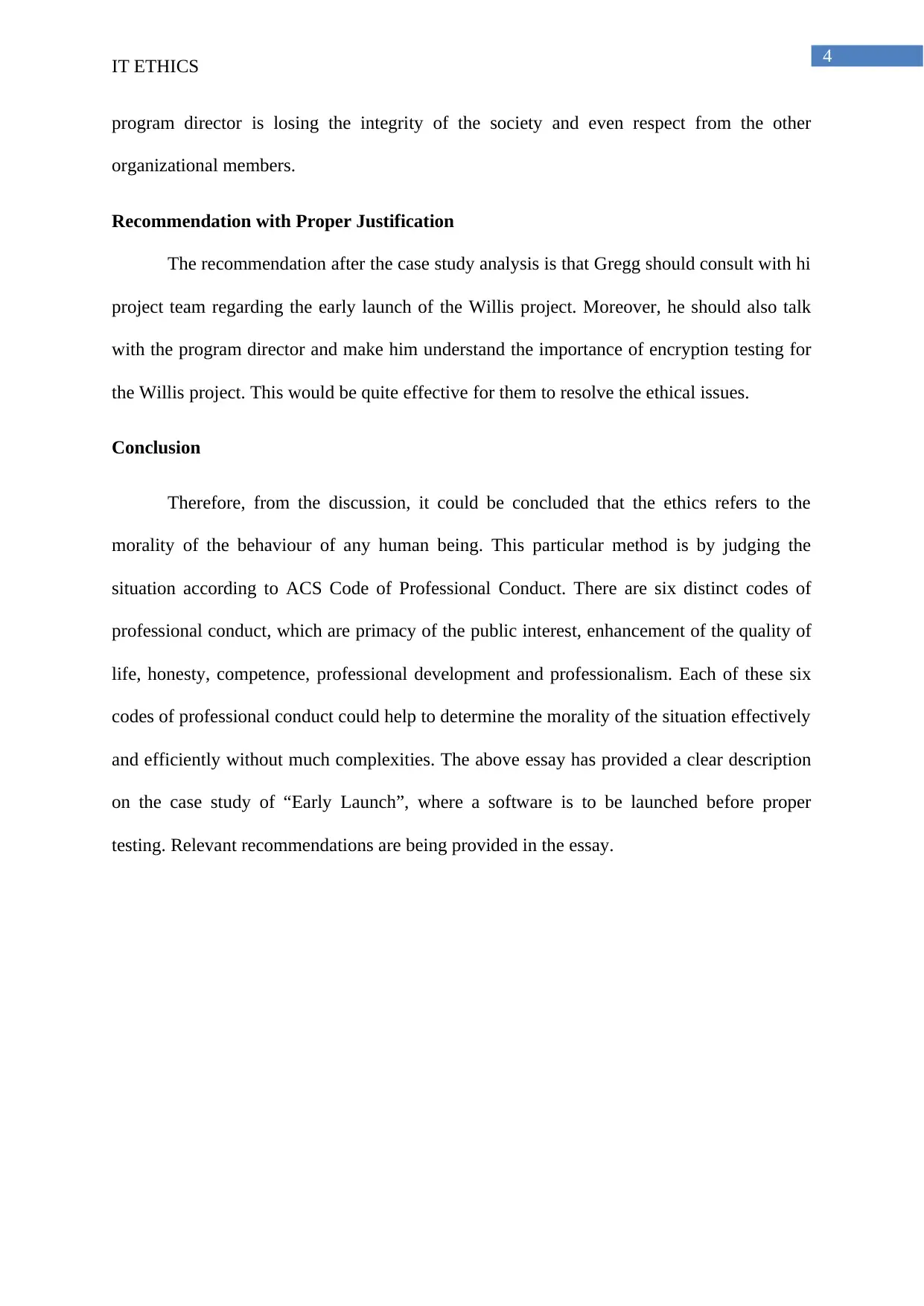
4
IT ETHICS
program director is losing the integrity of the society and even respect from the other
organizational members.
Recommendation with Proper Justification
The recommendation after the case study analysis is that Gregg should consult with hi
project team regarding the early launch of the Willis project. Moreover, he should also talk
with the program director and make him understand the importance of encryption testing for
the Willis project. This would be quite effective for them to resolve the ethical issues.
Conclusion
Therefore, from the discussion, it could be concluded that the ethics refers to the
morality of the behaviour of any human being. This particular method is by judging the
situation according to ACS Code of Professional Conduct. There are six distinct codes of
professional conduct, which are primacy of the public interest, enhancement of the quality of
life, honesty, competence, professional development and professionalism. Each of these six
codes of professional conduct could help to determine the morality of the situation effectively
and efficiently without much complexities. The above essay has provided a clear description
on the case study of “Early Launch”, where a software is to be launched before proper
testing. Relevant recommendations are being provided in the essay.
IT ETHICS
program director is losing the integrity of the society and even respect from the other
organizational members.
Recommendation with Proper Justification
The recommendation after the case study analysis is that Gregg should consult with hi
project team regarding the early launch of the Willis project. Moreover, he should also talk
with the program director and make him understand the importance of encryption testing for
the Willis project. This would be quite effective for them to resolve the ethical issues.
Conclusion
Therefore, from the discussion, it could be concluded that the ethics refers to the
morality of the behaviour of any human being. This particular method is by judging the
situation according to ACS Code of Professional Conduct. There are six distinct codes of
professional conduct, which are primacy of the public interest, enhancement of the quality of
life, honesty, competence, professional development and professionalism. Each of these six
codes of professional conduct could help to determine the morality of the situation effectively
and efficiently without much complexities. The above essay has provided a clear description
on the case study of “Early Launch”, where a software is to be launched before proper
testing. Relevant recommendations are being provided in the essay.
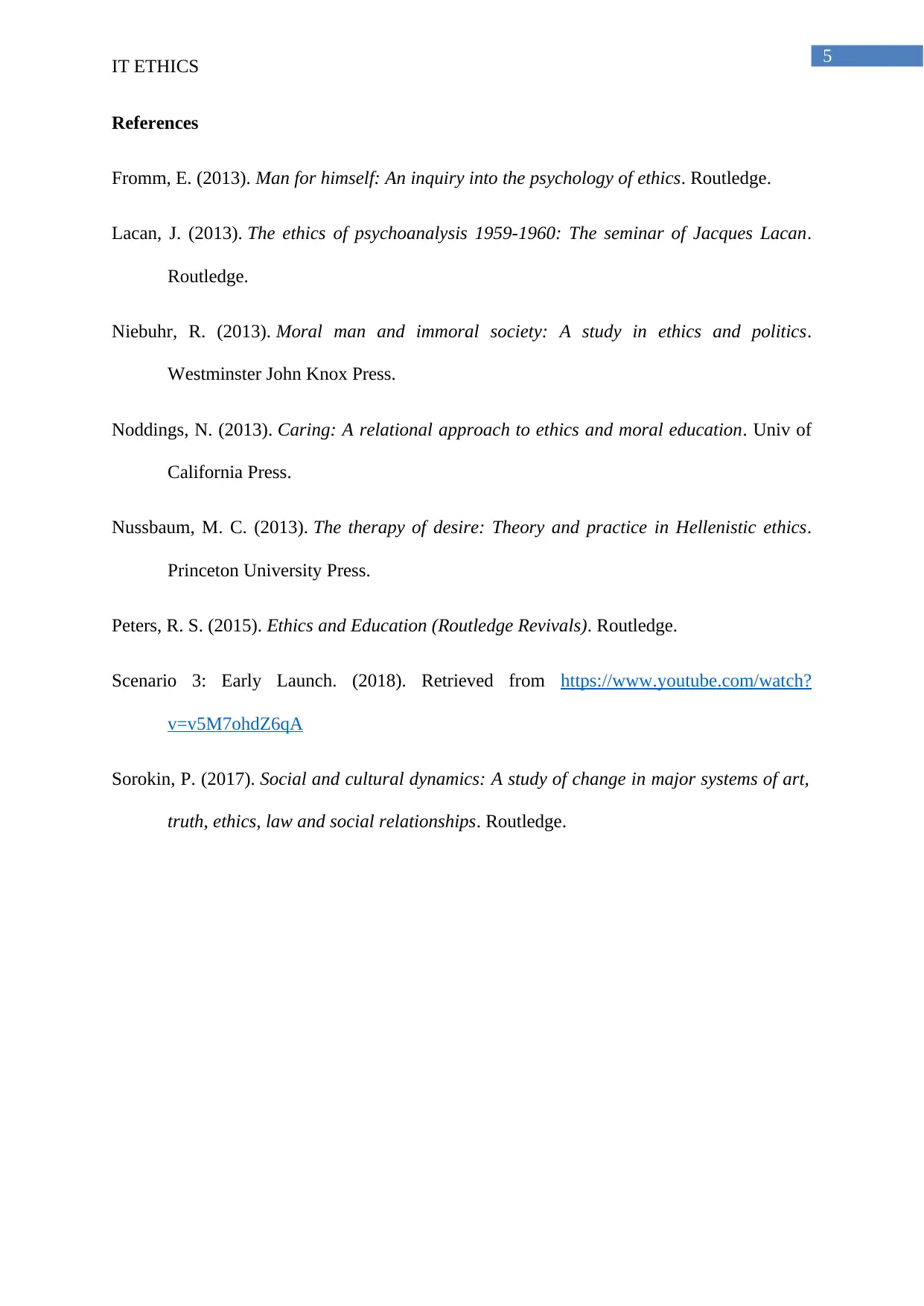
5
IT ETHICS
References
Fromm, E. (2013). Man for himself: An inquiry into the psychology of ethics. Routledge.
Lacan, J. (2013). The ethics of psychoanalysis 1959-1960: The seminar of Jacques Lacan.
Routledge.
Niebuhr, R. (2013). Moral man and immoral society: A study in ethics and politics.
Westminster John Knox Press.
Noddings, N. (2013). Caring: A relational approach to ethics and moral education. Univ of
California Press.
Nussbaum, M. C. (2013). The therapy of desire: Theory and practice in Hellenistic ethics.
Princeton University Press.
Peters, R. S. (2015). Ethics and Education (Routledge Revivals). Routledge.
Scenario 3: Early Launch. (2018). Retrieved from https://www.youtube.com/watch?
v=v5M7ohdZ6qA
Sorokin, P. (2017). Social and cultural dynamics: A study of change in major systems of art,
truth, ethics, law and social relationships. Routledge.
IT ETHICS
References
Fromm, E. (2013). Man for himself: An inquiry into the psychology of ethics. Routledge.
Lacan, J. (2013). The ethics of psychoanalysis 1959-1960: The seminar of Jacques Lacan.
Routledge.
Niebuhr, R. (2013). Moral man and immoral society: A study in ethics and politics.
Westminster John Knox Press.
Noddings, N. (2013). Caring: A relational approach to ethics and moral education. Univ of
California Press.
Nussbaum, M. C. (2013). The therapy of desire: Theory and practice in Hellenistic ethics.
Princeton University Press.
Peters, R. S. (2015). Ethics and Education (Routledge Revivals). Routledge.
Scenario 3: Early Launch. (2018). Retrieved from https://www.youtube.com/watch?
v=v5M7ohdZ6qA
Sorokin, P. (2017). Social and cultural dynamics: A study of change in major systems of art,
truth, ethics, law and social relationships. Routledge.
⊘ This is a preview!⊘
Do you want full access?
Subscribe today to unlock all pages.

Trusted by 1+ million students worldwide
1 out of 6
Related Documents
Your All-in-One AI-Powered Toolkit for Academic Success.
+13062052269
info@desklib.com
Available 24*7 on WhatsApp / Email
![[object Object]](/_next/static/media/star-bottom.7253800d.svg)
Unlock your academic potential
Copyright © 2020–2026 A2Z Services. All Rights Reserved. Developed and managed by ZUCOL.




